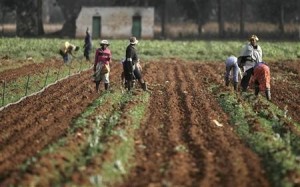
At the 2012 G8 Camp David Summit, President Barack Obama announced the creation of the New Alliance for Food Security and Nutrition, which aims to lift 50 million people in sub-Saharan Africa out of poverty in the next 10 years by supporting agricultural development (http://www.usaid.gov/unga/new-alliance). However, a closer look at the policy implementation shows that the G8 New Alliance Initiative is excluding small-hold farmer input and favoring agribusiness.
Since the formation of the New Alliance, ten countries have made more than 200 policy commitments, largely granting agribusinesses unprecedented access to decision-makers, including easing of export controls and tax laws as well as governments giving huge chunks of land of investment.
The CEOs of companies were invited to the table with African presidents and head of donor agencies through the New Alliance Initiative, although there was no representation for the subsistence farmers. While the private sector investment is supposed to ensure food security, the companies’ plans include non-food crops, including cotton, biofuels and rubber, or other goods for export markets. Companies have refused to publicly announce their full investment plans under the New Alliance. Olivier de Schutter, the UN special rapporteur on the right to food, said that governments have been making promises to investors with “no long-term view about the future of smallholder farmers.”
The chairman of Tanzania’s parliament’s public account, Zitto Kabwe, agrees. “By introducing this market, farmers will have to depend on imported seeds. This will definitely affect small farmers. It will also kill innovation at the local level. We have seen this with manufacturing,” he said. “It will be like colonialism. Farmers will not be able to farm until they import, linking farmers to [the] vulnerability of international prices. Big companies will benefit. We should not allow that.” Kabwe further argues that the tax commitments should go through parliament, not just the executive branch, as they would benefit companies rather than small farmers.
While the New Alliance has benevolent intentions to lift sub-Saharan Africa out of poverty, placing the project in the hands of private investors leaves room for error. Colin Poulton, research fellow at the center for development, environment and policy at the School of Oriental and African Studies in London, told Guardian “Without a clear theory of change indicating how increased investment in large-scale agriculture will lead to poverty reduction, improved food security of nutrition, and without clear plans to ensure that large numbers of outgrowers will be engaged in the new value chains, the New Alliance is so far primarily an initiative to commercialize agriculture in Africa.”
For more reading: http://www.theguardian.com/global-development/2014/feb/18/g8-new-alliance-condemned-new-colonialism (Picture Source)

